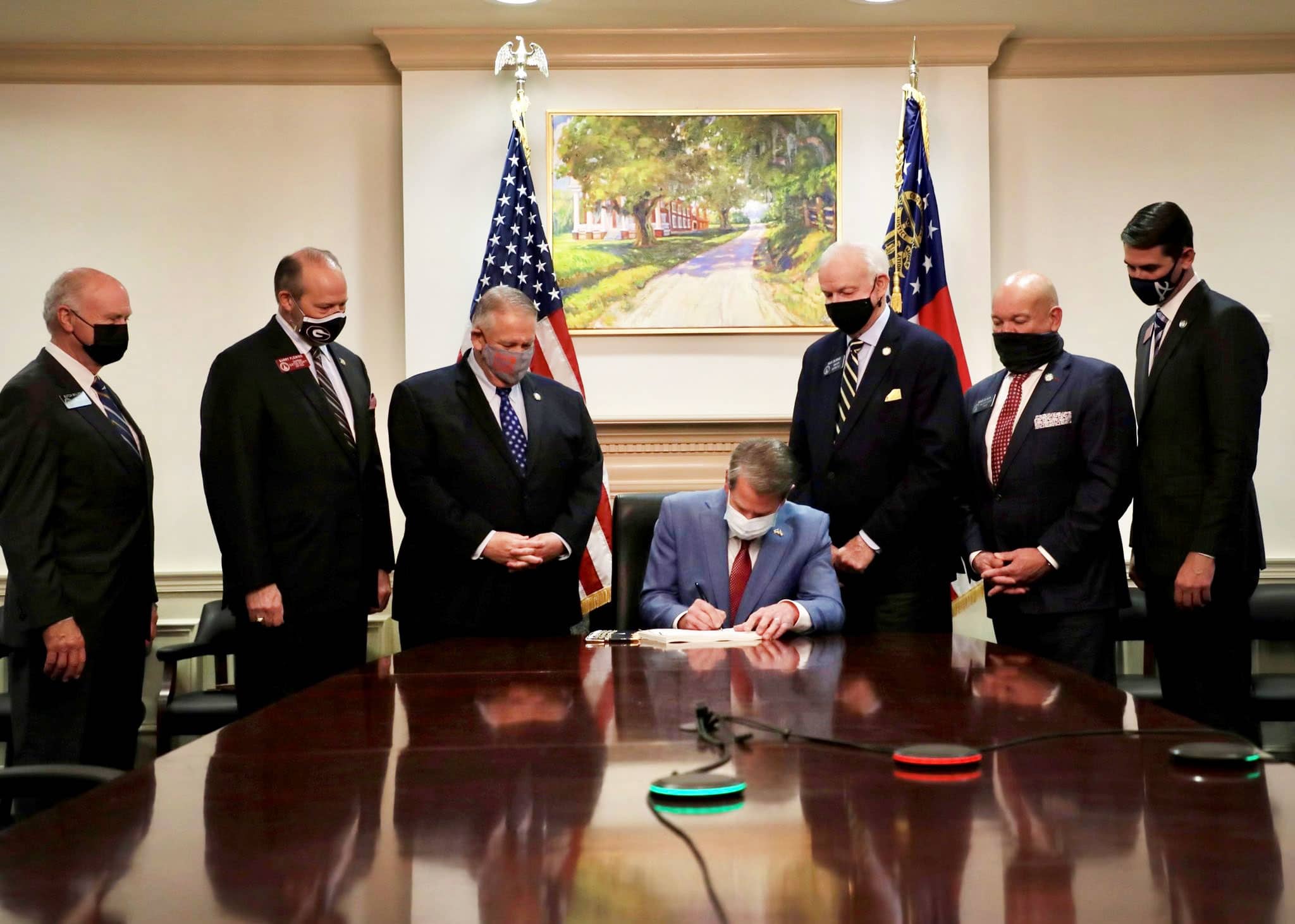Major U.S. companies take aim at Georgia’s new voting restrictions

Republican Governor Brian Kemp signs the law S.B. 202, a restrictive voting law that activists have said aimed to curtail the influence of Black voters who were instrumental in state elections that helped Democrats win the White House and narrow control of the U.S. Senate, in this handout photo posted to Kemp’s Twitter feed on March 25, 2021.
Governor Brian Kemp’s Twitter feed | Handout via Reuters
Business executives across the United States are calling out efforts to restrict voting access, after Georgia Gov. Brian Kemp signed a bill into law that opponents say would disproportionately disenfranchise voters of color.
Among the overhaul of state elections, the bill includes a restriction of drop boxes, makes it a crime to provide food or water to voters lined up outside polling stations, requires mandatory proof of identity for absentee voting and creates greater legislative control over how elections are run.
The bill is one of many Republican-backed election efforts introduced across the U.S. after former President Donald Trump, and other GOP members, falsely claimed that last year’s election defeat was due to fraud. For Georgia, it comes after historic turnout in the state’s election, particularly among Black voters and voters of color, in November general and January runoff elections.
Now, civil rights groups, corporate leaders and Democratic officials are denouncing the law.
CNBC compiled a list of corporate responses to the bill:
- Global asset manager BlackRock issued a statement Wednesday on LinkedIn.
“Equal access to voting is the very foundation of American democracy. While BlackRock appreciates the importance of maintaining election integrity and transparency, these should not be used to restrict equal access to the polls. BlackRock is concerned about efforts that could limit access to the ballot for anyone. Voting should be easy and accessible for ALL eligible voters. Voting is not just a right, but a vital component of civil activity. We should encourage all eligible voters to play this essential role in our democracy,” CEO Larry Fink wrote.
- Coca-Cola executive Alfredo Rivera said in a statement the company, which is headquartered in Georgia, is disappointed by the law. “As soon as Georgia’s legislature convened this year, our company joined with other Georgia businesses to share our core principles: We opposed measures that would seek to diminish or restrict voter access and we advocated for broad access, voter convenience, election integrity and political neutrality. Anything that inhibits these principles can lead to voter suppression. We took these steps because they align to our Purpose and the conscience we follow,” he said.
- Georgia-based Delta airlines said in a memo to employees that the “final bill is unacceptable and does not match Delta’s values.” “After having time to now fully understand all that is in the bill, coupled with discussions with leaders and employees in the Black community, it’s evident that the bill includes provisions that will make it harder for many underrepresented voters, particularly Black voters, to exercise their constitutional right to elect their representatives. That is wrong,” CEO Ed Bastian said.
- Pharmaceutical giant Merck said Wednesday that the company stands “strong on our core values including our commitment to social justice and the right of people to fully and freely participate in electoral processes.” “There is no more fundamental right than the right to vote. Democracy rests on ensuring that every eligible voter has an equal and fair opportunity to cast a ballot, free from restrictions that have a discriminatory impact. We all have an obligation to stand up against racism and other forms of discrimination whenever we see them,” the company added.
- Porsche‘s North American operations, headquartered in Georgia, issued a statement that “equal access to the polls for every voter is core to a democracy.” “As an Atlanta-based business, Porsche Cars North America (PCNA) supported the work of the Metro Atlanta Chamber with members of the Georgia General Assembly to maximize voter participation and ensure election integrity. We understand the legislative outcome remains subject to debate and hope a resolution can be found between all sides that encourages and enables every eligible vote,” the company said.
- Georgia-based UPS said this week the company supports the ability and facilitation of all eligible voters to exercise their right to vote. “Like other businesses in the community, we actively engaged with political leaders in both parties and other stakeholders to advocate for more equitable access to the polls and for integrity in the election process across the state. We echo the statement by the Metro Atlanta Chamber and stand ready to continue to help in ensuring every Georgia voter has the ability to vote,” the company said.
- Mercedes-Benz said that it “stands against efforts which discourage eligible voters to participate in this vital process.”
In a statement Wednesday to CNBC, Georgia Gov. Brian Kemp defended the law and specifically took aim at Delta’s chief executive.
“Today’s statement by Delta CEO Ed Bastian stands in stark contrast to our conversations with the company, ignores the content of the new law and unfortunately continues to spread the same false attacks being repeated by partisan activists,” Kemp, a Republican, said.
“Mr. Bastian should compare voting laws in Georgia — which include no-excuse absentee balloting, online voter registration, 17 days of early voting with an additional two optional Sundays, and automatic voter registration when obtaining a driver’s license — with other states Delta Airlines operates in,” he added.
CNBC’s Frank Holland, Mike Wayland, Phil LeBeau, Sara Eisen, Amelia Lucas and Leslie Picker contributed to this report.




